The 11 best VoIP apps for business in 2025, with customer reviews

Product Marketing Lead, Onboarding & Ecosystem

Tags
Share
Need to stay connected to clients and fellow team members on the go? With today’s increasingly mobile workforce, having the best VoIP app for your business communications is essential.
While using cell phones for business calls might seem convenient, it’s not always the most effective solution. For businesses with frequent interactions with customers, clients, and colleagues—or those that rely heavily on phone communication—investing in an enterprise VoIP app is a smart choice.
The best VoIP apps not only allow you to make business calls from your mobile device but also provide a complete communication system right on your phone or computer. These apps integrate phone calls, instant messaging, video conferencing, and even faxing—all within a single platform.
A basic cell phone simply can’t match this level of functionality. In this guide, we’ll explore what to look for in the best VoIP app, ensuring you choose the right tool to keep your business connected and productive, wherever your team is working from.
What is a VoIP app?
A VoIP app is a desktop or mobile app that uses VoIP (or Voice over Internet Protocol) technology to make phone calls over the Internet.
Some VoIP apps even let you do texting and SMS, and video conferencing too. (Well, the good ones do.) Typically, all you have to do is download the mobile or desktop app and sign up for an account to get started.
The thing to remember with VoIP apps is that even though the app itself is free to download, you’ll almost always need to have an actual voice plan in order to make phone calls on the app.
In most cases, you’ll need to subscribe to a voice plan with a business phone system provider first (we’ve got a bunch of options below along with pricing information) before you can use the VoIP app to make calls or send SMS messages.
Otherwise, you can have the app on your computer or phone, but it won’t be able to really do anything.
Key functions of VoIP apps
Choosing the right VoIP app will unlock a full suite of business communication tools that keep your team connected, productive, and customer-ready. Here are just a few key functions to look for:
📞 Call management features that let you easily handle every call—incoming, outgoing, or transferred—without missing a beat.
💬 Unified messaging to keep all your conversations in one place—no more juggling SMS, team chats, and calls.
🤖 AI and automations like real-time transcription to save you time, improve customer interactions, and help you act on insights faster.
🌐 Mobility and cross-device support that lets you work from anywhere without missing calls or messages.
🔗 Integrations and CRM connectivity to automatically log every call in your VoIP app to the tools your team already uses.
How we selected the best VoIP apps below
Choosing the right VoIP app can be overwhelming with so many options available. To compile this list of the best VoIP apps for businesses in 2025, we used publicly available information such as feature descriptions on vendors’ websites, pricing information, and customer reviews, to understand what each provider offers and how they compare across different business needs. Core functions like voice calls, messaging, video conferencing, call management, and AI-powered tools were all considered to ensure the apps we highlighted provide a robust set of capabilities for teams of various sizes and industries.
We also used publicly posted reviews and ratings on G2, a leading third-party software reviews website, to get insight into real-world usability, reliability, and support quality.
It’s important to note that this list is not exhaustive and is meant to be only a starting point for businesses exploring VoIP app solutions. The best way to get a hands-on feel for each app is always to sign up for free trials of different platforms!
How much do VoIP apps cost?
VoIP app pricing can vary pretty widely depending on the features, plan tiers, and the size of your team. Most providers charge on a per-user, per-month basis, but the total cost depends on several factors beyond just the monthly subscription. Understanding these factors helps you anticipate the true cost of adopting a VoIP solution for your business.
Plan tier and included features. Most VoIP providers offer multiple tiers, ranging from basic plans with essential calling and messaging to premium plans that include advanced features like AI-powered call transcription, analytics, integrated contact center tools, and CRM integrations. Higher-tier plans typically cost more but provide functionality that can significantly improve productivity, customer support, and team collaboration.
Team size and scalability. Per-user pricing means your total cost scales with the number of team members using the app. Prices tend to go up as you add more users, and also note that typically vendors offer discounts for annual subscriptions as opposed to month-to-month plans.
Integrations. Not all apps come with integrations. Some, like Dialpad Connect, may include certain integrations on the base plan, but you should pay attention to the other tools that you’ll want to link up to your VoIP app (like Google Workspace, Microsoft Teams, or Salesforce), which may result in higher prices.
Other costs. Some VoIP solutions require additional hardware (like desk phones or headsets) or higher-tier internet connections for optimal call quality. While the app itself may be affordable, these incidental costs can affect your overall budget.
To give you a general sense of cost, most business VoIP apps start at around $10 to $20 per user per month for basic plans that cover unlimited calling, SMS/MMS + team messaging, and mobile / desktop access. Higher-level plans with more advanced features—like call analytics, AI tools, and advanced integrations—usually range from $25 to $40 per user per month.
The 11 best VoIP apps for businesses in 2025
Choosing the best VoIP app for your business can make a major difference in how effectively your team stays connected, whether they're in the office or on the go. Here are the 11 best VoIP phone apps for businesses in 2025, offering a range of features to meet diverse communication needs:
Dialpad Connect
CloudTalk
Ooma Office
Grasshopper
Line2
Mitel
Aircall
Zoom Phone
Zoiper
WhatsApp
Viber
I’ll go into each of these in more detail below.
1. Dialpad Connect: Best for AI-powered business communication
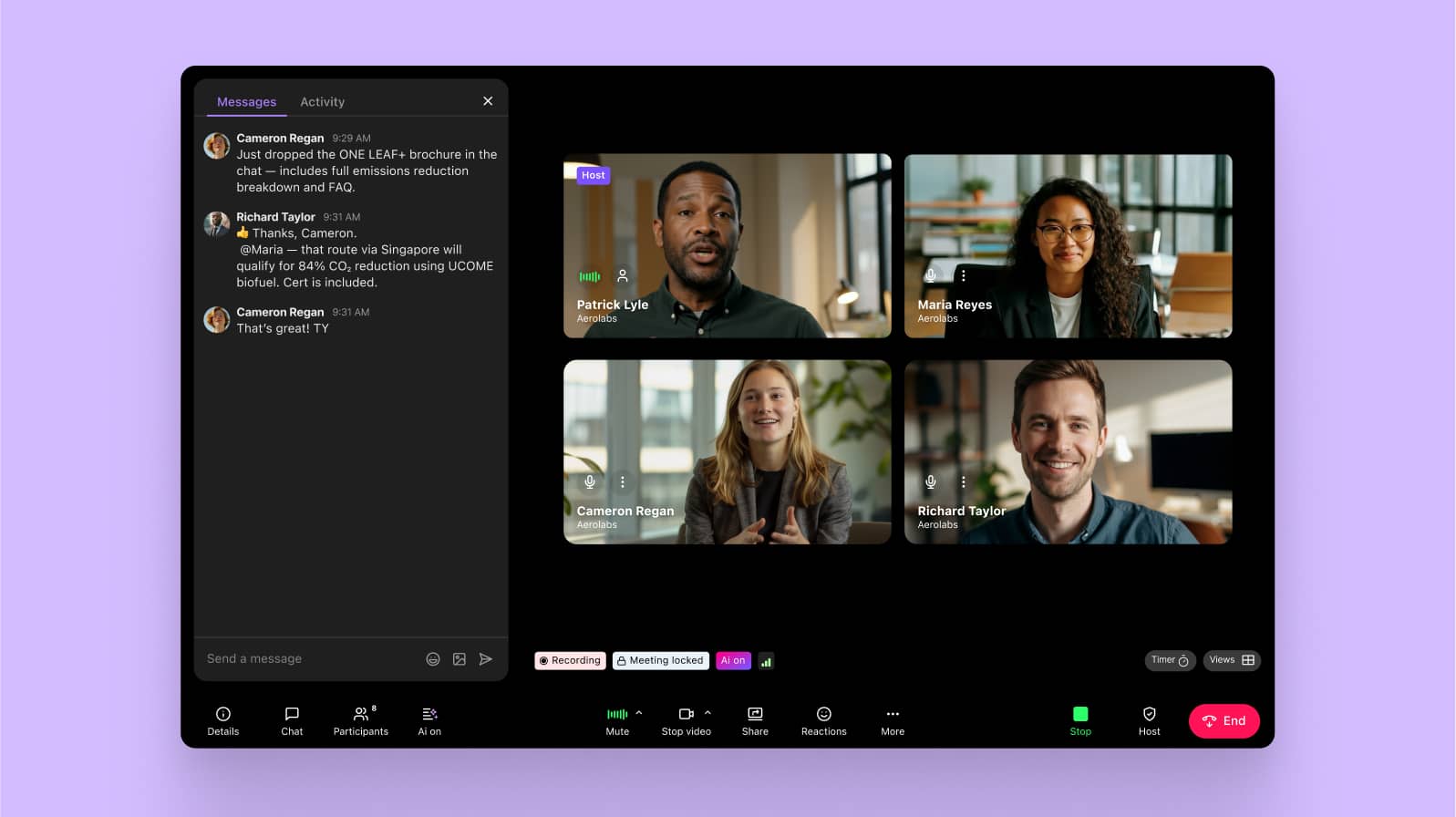
Dialpad is an all-in-one cloud communication platform that combines voice, messaging, video, and AI-driven cloud contact center features. Its real-time AI transcription, post-call summaries, and sentiment analysis help teams stay productive while providing an excellent customer experience.
You can talk, message, and meet with clients, teammates, and more—all from the desktop or softphone / mobile app. You can make calls from any caller ID you want (could be your personal business number or extension, or your main company line) and transfer calls from the app...
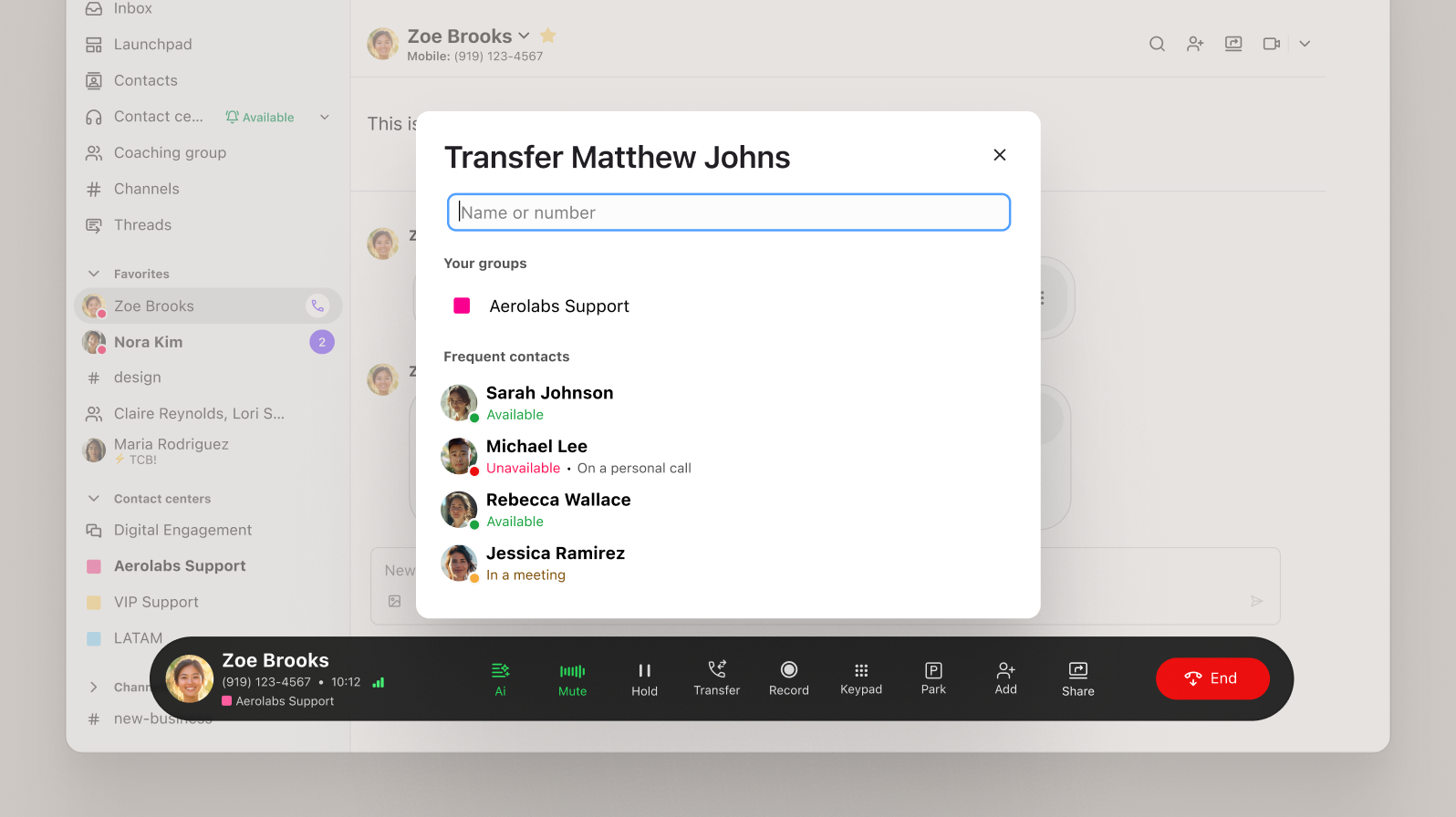
You can open up screen sharing on the mobile app while you’re on a phone call, and even flip a call from your cell phone to your computer (or vice versa) without interrupting your conversation.
But what really sets Dialpad apart is its artificial intelligence, Dialpad AI. With built-in speech recognition and natural language processing, Dialpad AI transcribes all your calls, meetings, and voicemails with industry-leading accuracy. You can see the running transcription for your call or meeting, right in your active call window:
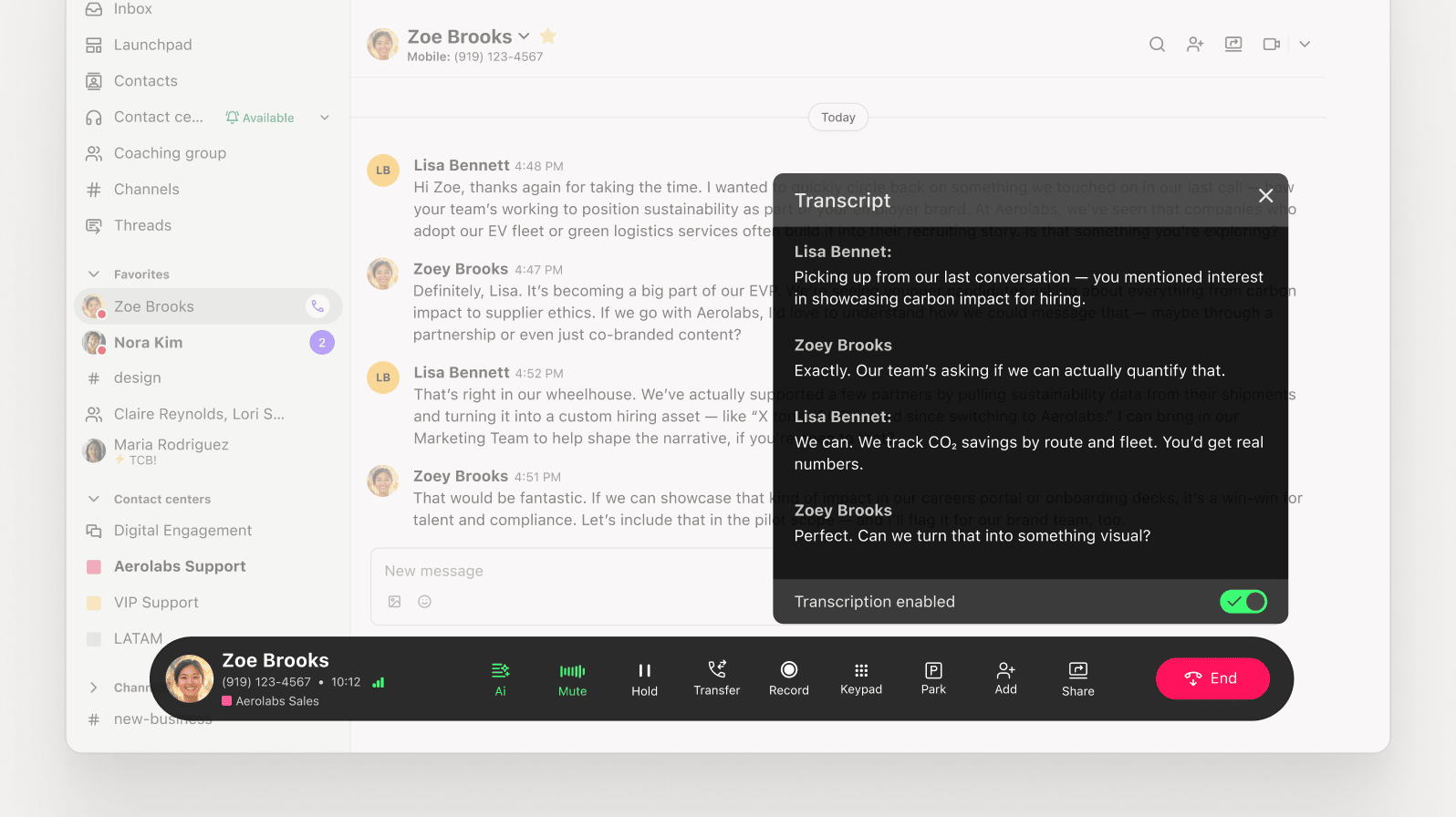
Dialpad AI also sends your call's attendees a convenient recap email after the meeting is over, with the searchable voice-to-text transcript, call center transcripts, action terms, and recording, all compiled into an easily-digestible overview.
And if you have a customer support or outbound sales team, Dialpad has fully integrated contact center functionality too, likesentiment analysis and AI Live Coach, designed to help agents through difficult conversations and significantly reduce training constraints.
With AI Live Coach, Dialpad AI is always standing by, ready to help. Whenever a customer mentions a certain keyword (like the name of a competitor, or whatever else you want to set up), it triggers the AI to pop up helpful notes for the agent. Dialpad AI can automatically scrape every connected knowledge base in real time to pop up useful resources for agents:
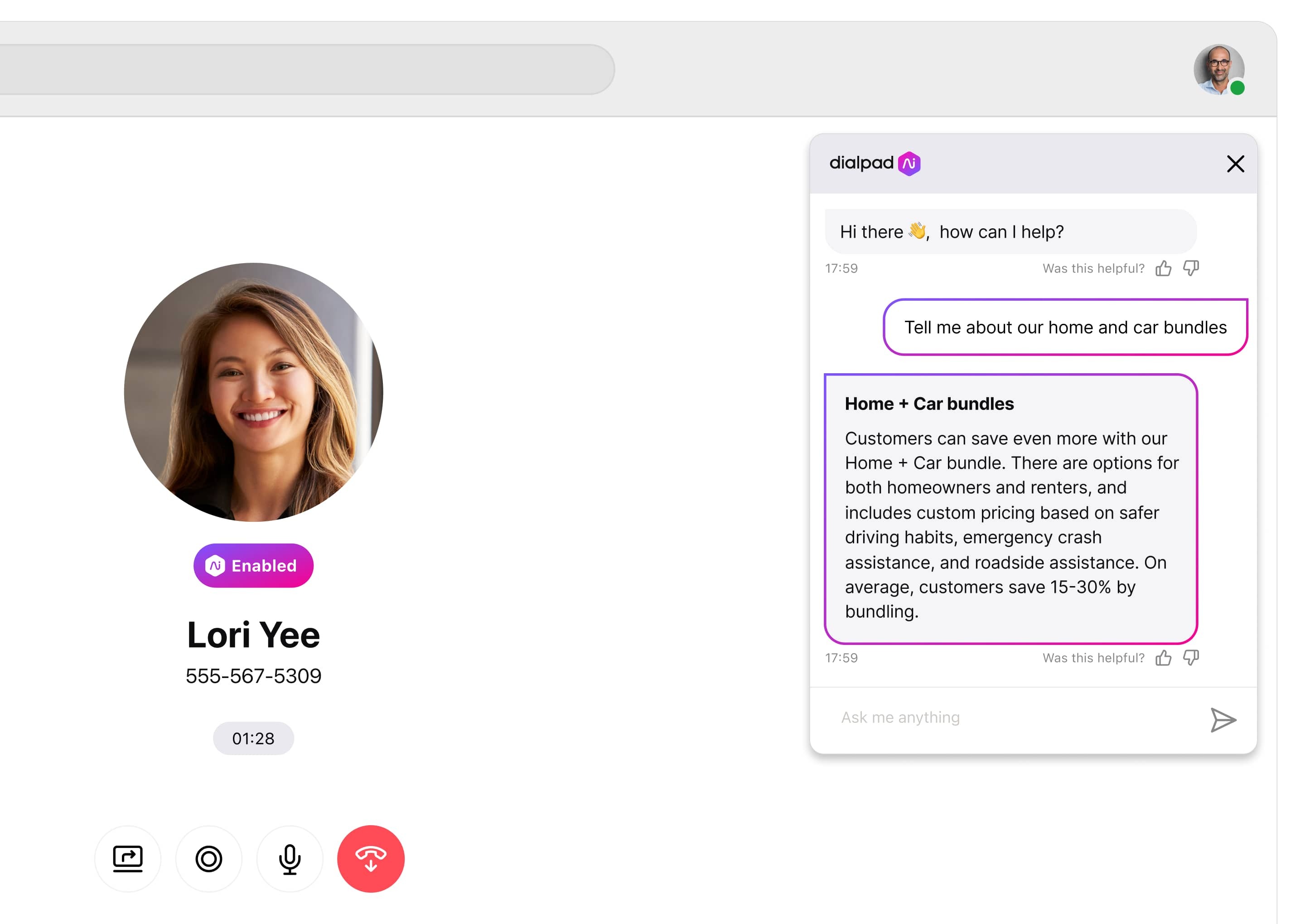
Want to know how your customers are feeling, even the ones who don’t fill out your CSAT survey—or even if you don’t have a CSAT survey? AI CSAT automatically infers CSAT scores from every call, making it easy for every company to access meaningful customer insights.
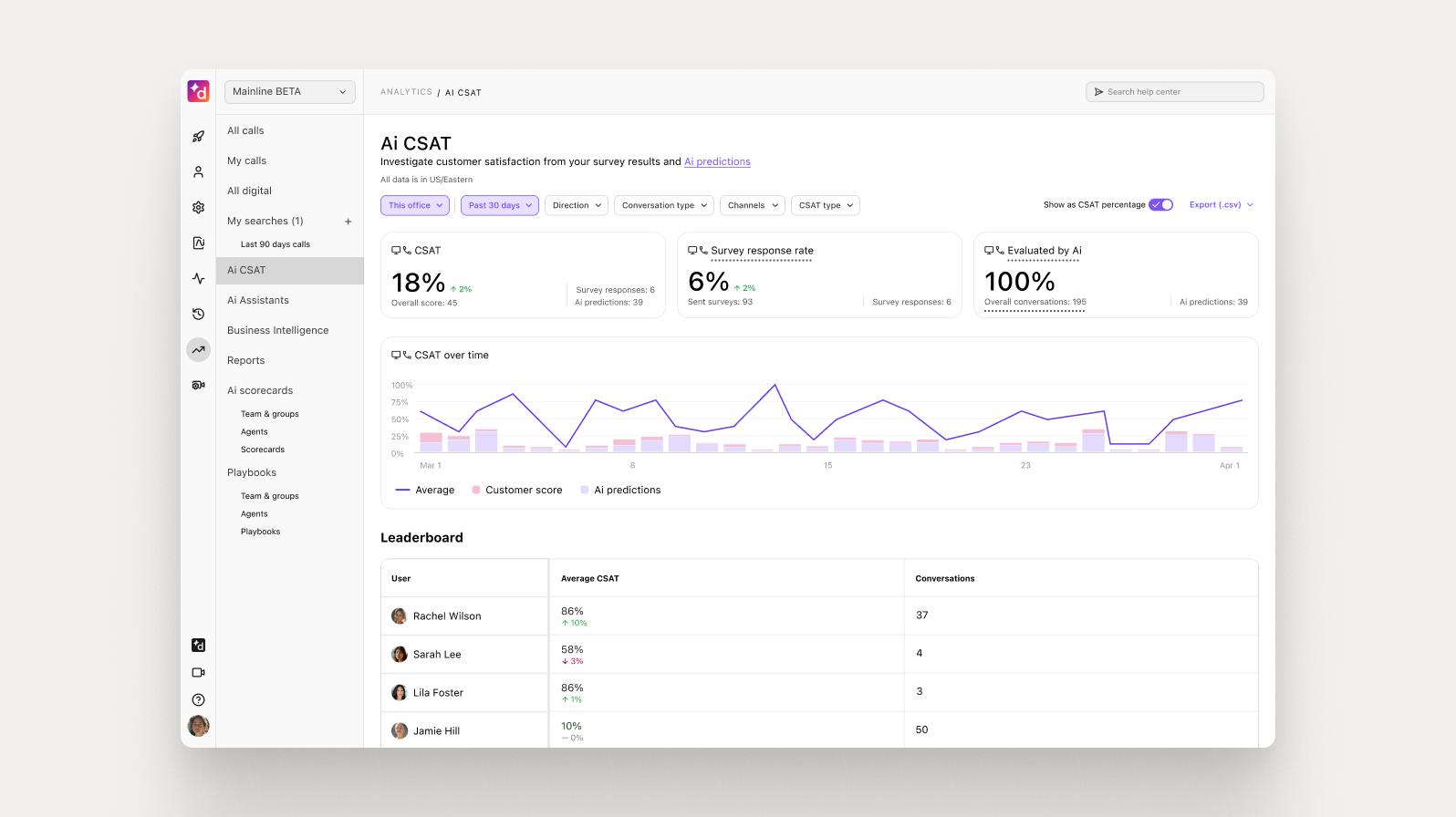
So if you’re looking for a VoIP app that has every functionality a business would need, even on the most basic pricing plans, then take Dialpad for a spin.
But don’t take our word for it...
Features
Keep existing business numbers and seamlessly transition your team without changing your contact info.
HD conference calls and crystal-clear audio for internal and client meetings.
Call forwarding service and call transfer to ensure every call reaches the right person, anywhere.
Browser and mobile access so you can work from any device without interruptions.
AI-powered features like automatic call transcription, post-meeting summaries, and sentiment analysis help improve team performance.
Integrations with essential tools like Google Workspace, Salesforce, Zendesk, and Microsoft Teams for a more streamlined workflow.
Pros:
AI transcription available even in the cheapest plan
Cross-device call flipping keeps conversations seamless
Quick setup for new teams and numbers
Cons:
Some advanced AI features require higher-tier plans
Some reporting features may be overwhelming for very small teams
What users are saying
“Feature rich VoIP solution for our business. It is very easy to manage online and can access phone and messaging features from anywhere - desk phone, cell phone, laptop. Been using Dialpad for a few years now for both VoIP and conference call solutions.” — Jason H., CEO, Small business
Pricing
Platform | Starting price | Free trial |
Dialpad Connect |
Don't call it a VoIP app
With Dialpad, you get not only VoIP calls, but an entire AI-powered customer communications platform. In other words, voice, meetings, messaging, sales capability, and a contact center all in one, beautiful workspace. Try it free for 14 days—signup takes just a few minutes, and you'll be set up with a virtual phone number too. Or, book a personal walkthrough with our team!
2. CloudTalk: Best for Sales and Support teams
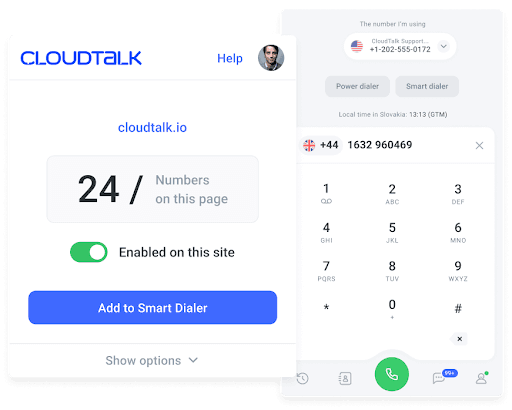
CloudTalk is a cloud-based phone software for sales and support teams. This VoIP phone system is targeted mainly at organizations that want to improve their customer experience or close more deals. CloudTalk can be integrated with a variety of tools such as your CRM system.
Features:
Call recording for monitoring team performance
Click-to-call and daily summaries to save time on outbound calling and stay organized.
Concurrent calling to handle multiple calls simultaneously without dropped connections.
Pros:
CRM integrations for sales teams
Easy setup and user-friendly interface
Cons:
No video conferencing features included
Some basic features, like IVR, require higher-tier plans
What users are saying
“Seamless HubSpot Integration: Syncing call data and notes is effortless, making lead management smooth… When I try to review other agents’ calls through the dashboard, there’s noticeable buffering and delays — even with a fast internet connection. It makes quality monitoring feel clunky and inefficient.” — Zaid M., Telesales Executive, Mid-market company
Pricing
Platform | Starting price | Free trial |
CloudTalk | $19 per user per month1 | N/A |
3. Ooma Office: Best for small businesses with limited scalability needs
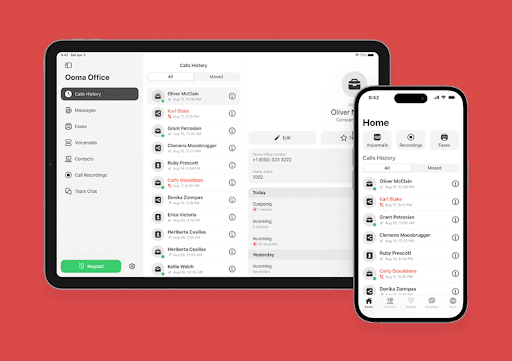
Ooma Office is a VoIP system that’s tailored to smaller businesses and offers both software and hardware options with core calling features. While the system is relatively simple, note that Ooma doesn't have call recordings or video conferencing on their most basic plan. (Dialpad’s most basic plan comes with both.)
Features
Auto attendant that routes customers to the right person automatically
Conference calling to connect multiple stakeholders at once
Unlimited calling to the US, Canada, Mexico, and Puerto Rico
Pros:
Hardware options available
Easy for non-technical teams to use
Cons:
Lowest plan is more expensive than some others on this list
Basic plan lacks call recording and video conferencing
What users are saying
“I like that once logged into the app, our phone calls can ring on devices logged into the app thus ensuring that we do not miss a client's call… While the text feature is great, it is disappointing not to be able to conduct a search of the texts on the app version of Ooma.” — Liza G., Sole Practitioner, Small business
Pricing
Platform | Starting price | Free trial |
Ooma Office | $19.95 per user per month2 | N/A |
🤿 Deep dive:
Get a closer look at Dialpad vs Ooma here.
4. Grasshopper: Best for solopreneurs
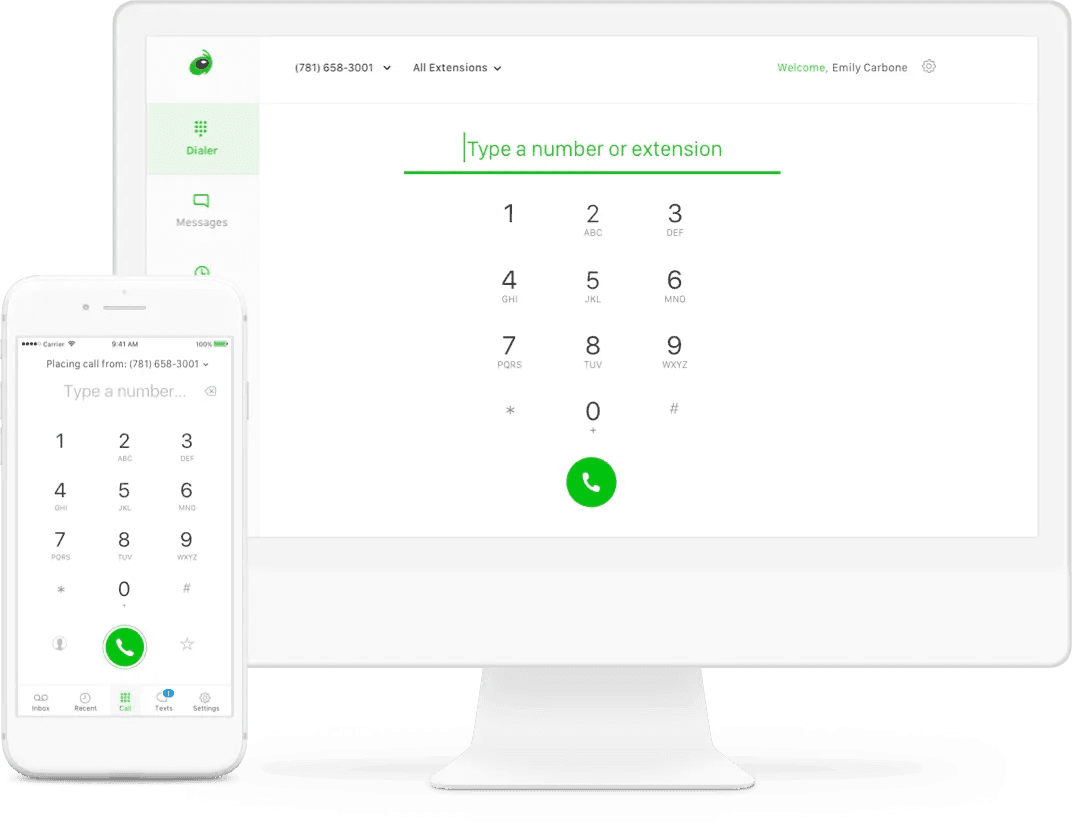
Grasshopper is a cloud-based VoIP phone system and app that is heavily targeted toward small businesses—specifically, solo professionals and small businesses that need a professional number and straightforward VoIP calling. Like most of the other VoIP app options on this list, it has both a mobile and desktop app that lets you make voice calls and send SMS messages. (Learn more about the best Grasshopper alternatives.)
Grasshopper does have three tiers of pricing plans, but it looks like the only difference between the three is how many phone numbers and extensions you get. They do all come with the basics, like call forwarding, Wi-Fi calling, and—but if you want more advanced features like real-time call transcriptions or unified communications, you’ll want to look at other VoIP services (which cost less and come with more features).
Features
Wi-Fi calling and call transfer to help you stay connected on any device
Custom extensions for a more professional business presence
Voicemail transcription that sends messages to email for added convenience
Pros:
Extremely simple and pared down features
Supports SMS and voicemail
Cons:
Lack of advanced features
Price scales quickly with more numbers
What users are saying
“It is a powerful tool to make calls and receive text messages, along with listening to faxes and voice messages after calls… It freezes a lot. It asks for multiple updates, and it does not update. Sometimes calls drop without a notice, and if they close the call, then it freezes and we have to restart the app.” — Samuel M., Team Lead, Small business
Pricing
Platform | Starting price | Free trial |
Grasshopper | $14 per month (1 user only)3 | Yes |
5. Line2: Best for adding a second business phone number
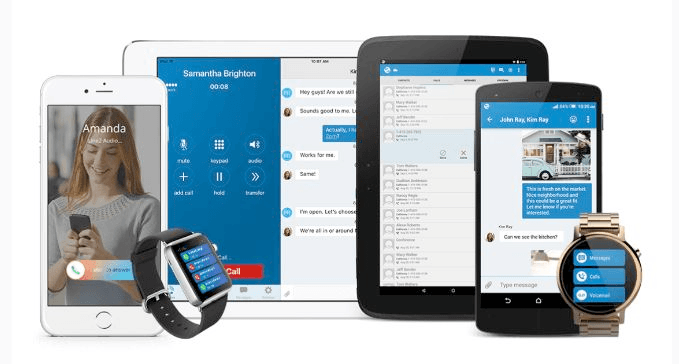
Line2 is a business phone solution that allows you to have a second phone number on your mobile devices or computer. It works across Windows, Apple iOS, iPhone, and Android devices. If all you want is a VoIP app and basic calling, it’s not bad.
Features
Unlimited calling in U.S. and Canada
Call recording to capture important conversations for reference later
Cross-platform support that works on Windows, Mac, iOS, and Android
Pros:
Low-cost entry for a second line
Works across multiple devices
Cons:
Lack of other communications channels (video conferencing and instant messaging)
Lack of some pretty basic telephony features like call recording and call routing
What users are saying
“Line2 is cost effective, I think about $10 per month and it serves the purpose of adding a second line to an existing phone… There are some downsides. Texting is glitchy and it only allows one photo (attachment) per text, Not great if, like me, you need to send multiple photos, you end up needing to send multiple texts.” — Simon W., Owner/Operator, Small business
Pricing
Platform | Starting price | Free trial |
Line2 | $7.99 per month4 | N/A |
6. Mitel: Best for hybrid workspaces
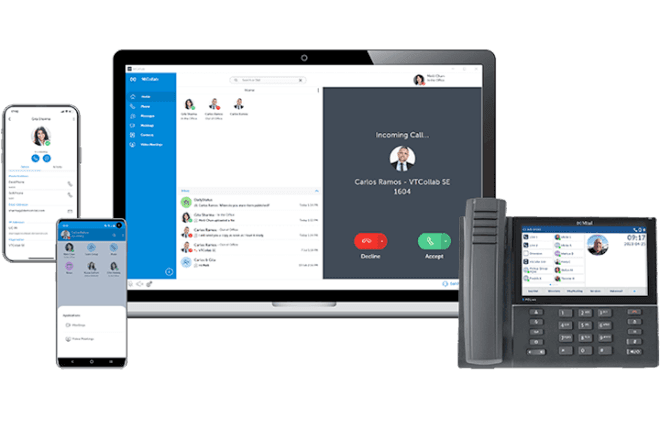
Mitel is a business communications provider with different products for video meetings and calling. There’s Mitel’s Hybrid Zoom Workplace, which combines Mitel’s telephony with Zoom’s video conferencing features, MiCollab, which combines calling, messaging, presence, and scheduling features, OpenScape UC, and Unify Phone. It can get confusing, so you’ll likely need to speak with their Sales team to figure out the right package for your business.
Features
On-premises and cloud products to give you different deployment options
Conference calling and messaging to cover all your communication channels
Pros:
Flexible deployment for hybrid teams
Supports global organizations
Cons:
Confusing product lineup
Pricing lacks transparency
What users are saying
“MiCollab started great for us in regards [to] enriched features that we loved. The desktop/mobile applications were great with even better deskphones… Support was an issue for us. It would take days to get support on small issues and the larger issues would take at least a day if I didn't contact them several times. The admin portal was a mess and not user friendly.” — Verified User in Utilities, Small business
Pricing
Platform | Starting price | Free trial |
Mitel | Contact Mitel’s sales team for a quote.6 | N/A |
📚 Further reading:
Learn more about the best Mitel alternatives that won't break the bank.
7. Aircall: Best for small modern contact centers
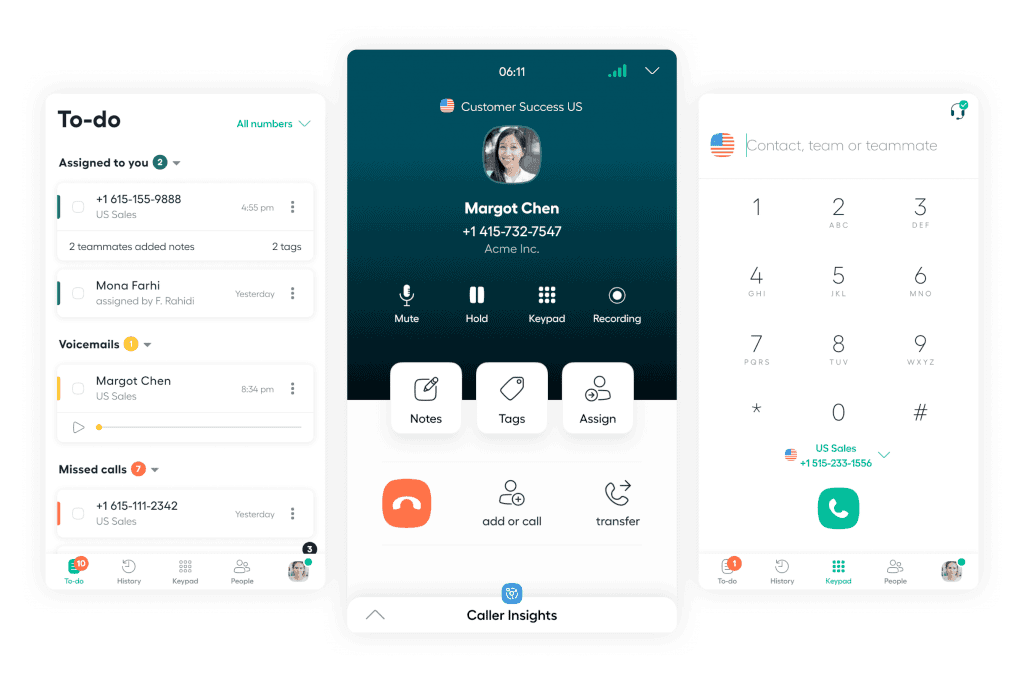
Aircall is a newer player that offers cloud-based communication solutions in the form of a mobile and desktop app. It has one of the better-looking VoIP apps on this list, and lets you record calls and do other contact center tasks like assign calls to teammates from the app. (Get a closer look at how Aircall compares to Dialpad.)
Features
Team call assignments to distribute calls across agents efficiently
Voicemail and IVR for handling customer calls with ease
Call recording for training and compliance
Pros:
Attractive and user-friendly design
Contact center–ready features
Cons:
Higher entry price
Reporting can be limited in lower tiers
What users are saying
“What I appreciate most about Aircall is its great ease of use right from the first time you use it. The interface is clear, intuitive, and implementation is quick, even for teams without advanced technical skills… Some advanced features could be a bit more customizable to suit all use cases. Finally, the price may seem a bit high for small teams, especially if they do not use all the offered integrations.” — Shawn K., Chargé de Clientèle, Small business
Pricing
Platform | Starting price | Free trial |
Aircall | $30 per user per month.7 | Yes |
8. Zoom Phone: Best for teams already using Zoom
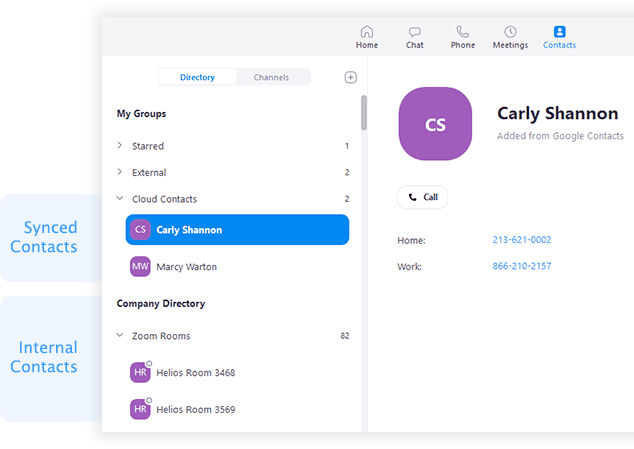
Zoom Phone extends the familiar Zoom experience into business telephony. It’s a natural fit for teams already using Zoom Meetings. It has a VoIP desktop and mobile app that lets you make calls and do all your basic phone-related tasks, but the one thing is that their outbound calling is metered. (Learn more about the best Zoom Phone alternatives.)
Features
Domestic US and Canada-wide calling, metered or unmetered
Video conferencing and messaging in the same platform, no need for multiple apps
Pros:
Makes sense if you already use Zoom
Strong video integration
Cons:
Doesn’t have an integrated contact center product if you truly want to consolidate all your communications in a single platform
No glaring cons, but you have other similarly priced and similarly full-featured options (such as Dialpad Connect) if your team prefers a different user interface or tool
What users are saying
“Zoom Phone is very reliable for day to day communication. I like its simple integration with zoom meetings and how easy it is to use to make and receive calls directly from the same platform I already use for video meetings… The admin portal could be more intuitive - setting up advanced call routing takes some effort. Also, the mobile app sometimes has minor glitches when switching between Wi-Fi and mobile data.” — Dileepsingh R., Senior Software Engineer, Enterprise company
Pricing
Platform | Starting price | Free trial |
Zoom Phone | $10 per user per month (with metered billing).8 | Yes |
9. Zoiper: Best for teams that need SIP-based PBX capability

Zoiper offers both paid and free VoIP apps for PC, Linux, Mac, Android, and iOS. With Zoiper, you can make calls via a PBX or SIP provider. The app’s UI is a little dated, but the main challenge is that unlike most SaaS options on this list, Zoiper charges you a one-time fee for the license—not a monthly subscription fee. (Learn more about the best Zoiper alternatives.)
Features
Cross-platform compatibility that works on virtually any device
Bring-your-own-SIP so you can use it with your existing provider or PBX phone systems
Pros:
No monthly subscription
Good for technical users who already have a SIP provider
Cons:
Dated user interface
Updates and add-ons may cost extra
What users are saying
“The intuitive and clean interface makes it accessible for users of all skill levels. Even those who are not tech-savvy can navigate and use the application with ease… While the free version of Zoiper is functional, many of the more advanced features such as call recording, video calls, and faxing are only available in the paid versions. This can be a drawback for users or small businesses with limited budgets who need these advanced functionalities.” — Getrude S., Senior Portfolio Quality Officer, Mid-market company
Pricing
Platform | Starting price | Free trial |
Zoiper | €59.95 per license.9 | Yes |
10. WhatsApp Business Platform: Best for simple, secure messaging and calls
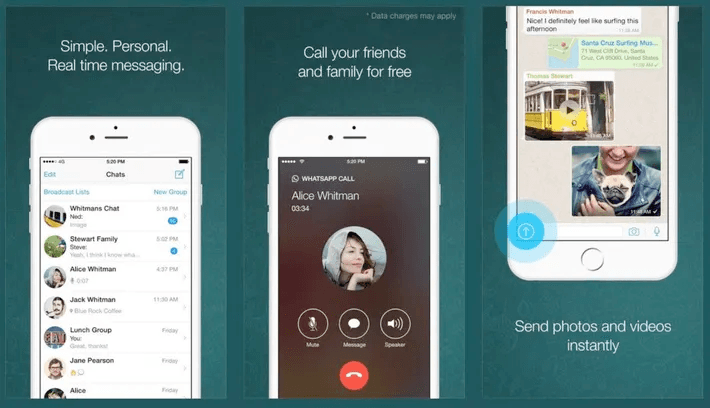
The WhatsApp Business Platform builds on WhatsApp’s global messaging network, giving companies tools to manage customer communication at scale. It’s ideal for businesses that want to offer chat-based support, send notifications, and engage customers on a familiar, secure channel.
Features
Two-way customer messaging to provide real-time support where customers already are
Rich media messages that let you share images, documents, and product catalogs in conversations
Automated responses and chatbots so contact center teams can save time
Pros:
Global reach with billions of active users
Secure, encrypted messaging trusted by customers
Cons:
Not a full business phone system (voice and telephony features are still a bit limited)
Costs can add up with high message volumes
What users are saying
“It feels just like chatting with a friend, but with professional tools built in. I really like the quick replies and auto-responses — they save me time when I’m busy. I also love that I can organize customers using labels, which helps me keep track of orders, inquiries, and follow-ups… What I dislike about WhatsApp Business is the way the updated layout looks — especially with the status and groups mixed together. It feels a bit confusing now. Also, when I try to ping or broadcast messages, I wish I could select more contacts at once.” — Orlando Roy G., Bank Teller, Small business
Pricing
Platform | Starting price | Free trial |
Free (per message pricing)10 | Yes |
11. Rakuten Viber: Best for international calling on a budget

Rakuten’s Viber Out is another free VoIP app that you pay for via credit and calling plans. With Viber, you can access group chats, video calls, and more. Viber offers low-cost international calling options, making it appealing for personal use and small teams working across borders.
Features
Local and international calls for staying connected globally
Group messaging and video to keep small teams aligned
Pros:
Good for global communication
Simple to adopt for small teams
Cons:
Business-grade features are extremely limited
Not a realistic option for larger businesses
What users are saying
N/A on G2
Pricing
Platform | Starting price | Free trial |
Viber Out | $5.99 per month for worldwide calling11 | Yes |
Must-have features for VoIP apps
At a minimum, any VoIP app should include these essential features:
Reliable voice calling over the Internet. After all, the core function of a VoIP app is to make and receive calls over Wi-Fi and cellular data networks..
Device compatibility. A good VoIP app should work on both desktop and mobile so you’re not tied to one device.
Call setup and management, including basic features like dialing, answering, holding, and ending calls.
Custom caller ID so you can use your personal cell phone to make calls while displaying your work caller ID.
Basic call forwarding so you can redirect calls when you’re away from your primary device.
Challenges of VoIP apps (and how to solve them)
When you’re implementing a new VoIP app, there are some potential roadblocks to keep in mind—and some of these will apply even if you chose the best VoIP app for your business. Here are the most common ones and practical ways to address them:
Challenge: Call quality depends on your internet connection
Solution: A strong broadband or mobile data connection is key. Some VoIP providers, like Dialpad, have global voice networks that give you clear audio around the world. If call quality is a concern, you might also consider a provider that offers real-time monitoring so they can help you troubleshoot issues quickly.
Challenge: Security and compliance risks
Solution: Any VoIP provider should offer enterprise-grade encryption, secure data storage, and compliance certifications (GDPR, HIPAA, SOC 2). Double-check what protections are included by default versus available only on higher plans. For example, Dialpad encrypts calls and messages in transit and at rest, giving you peace of mind without extra setup or costs.
Challenge: Scaling as your business grows
Solution: Choose a VoIP app that lets you add users, numbers, or even new office locations in minutes instead of weeks. Cloud-native providers like Dialpad let you spin up new lines through an admin dashboard, no hardware or IT help needed:
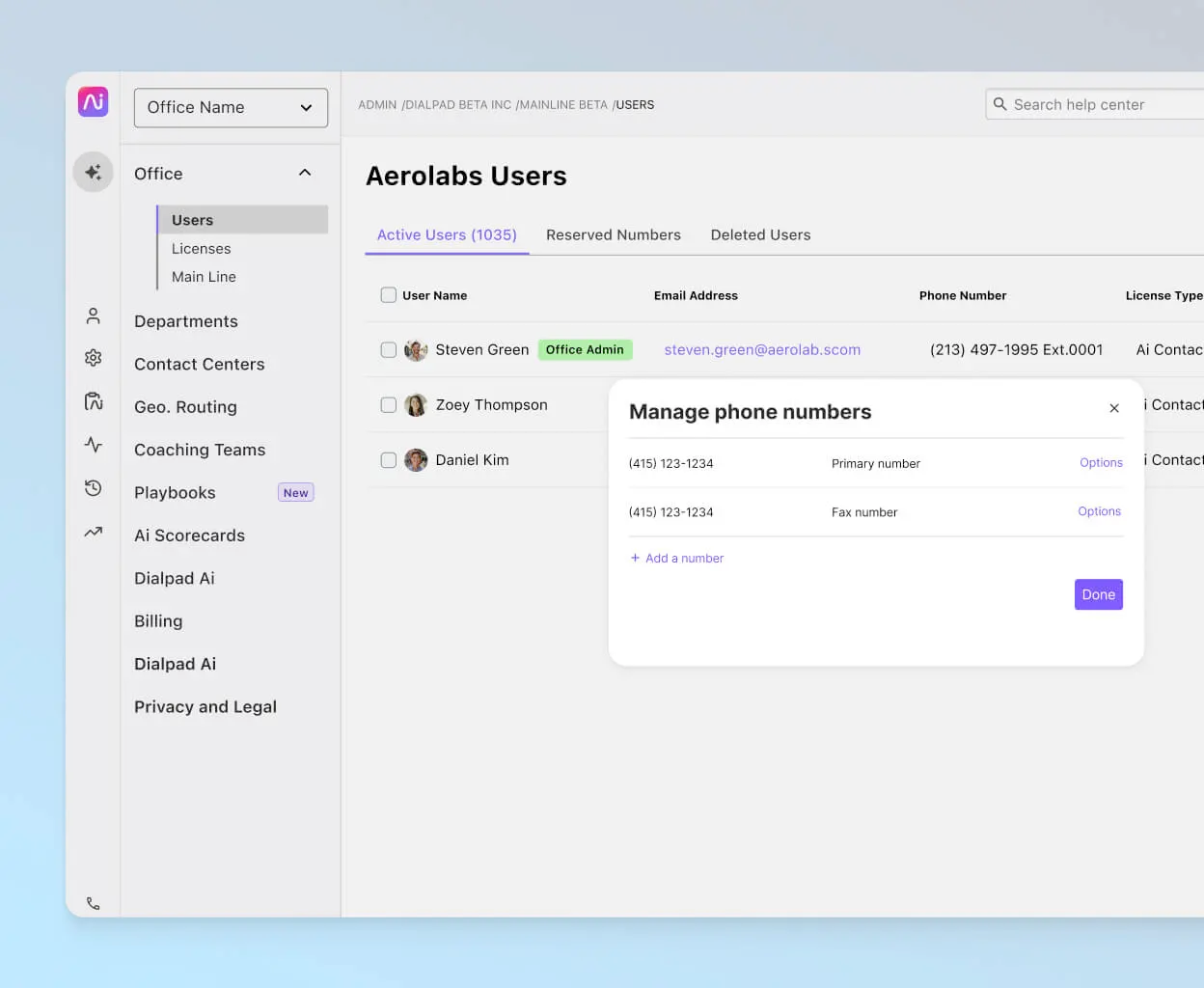
How to choose the best VoIP app
Choosing the best VoIP app for your business requires you to evaluate your specific needs, particularly in terms of cloud-based versus on-premises solutions. Here are a few things to think about:
Types of VoIP: Cloud-based vs. on-premises
Understanding the differences between cloud-based and on-premises VoIP systems is crucial in making the right choice:
Cloud-based VoIP: Hosted by a third-party provider, cloud VoIP offers scalability, flexibility, and reduced upfront costs. This option is ideal for businesses looking to minimize IT overhead while gaining access to the latest features and updates. Cloud-based VoIP also allows for easy remote access, making it perfect for businesses with distributed teams or those embracing hybrid work models.
On-premises VoIP: Managed internally, on-premises VoIP provides greater control over the system but requires significant investment in hardware and IT resources. This option may suit businesses with specific security or compliance needs that prefer to keep their communication infrastructure in-house. However, it can be less flexible and more costly to maintain and upgrade compared to cloud-based solutions.
For most businesses, cloud-based VoIP is the preferred choice because of its ease of deployment, lower maintenance costs, and ability to support remote work.
Ease of use
A VoIP app should be intuitive and easy for your team to use:
User interface: The interface should be straightforward, with clear navigation and easy access to essential features.
Setup and configuration: Look for apps that offer simple installation processes and minimal configuration requirements.
Cross-platform compatibility: Ensure the app works seamlessly across both desktop and mobile devices.
Security
As we mentioned earlier, security is vital, especially when dealing with sensitive conversations and customer data:
Encryption: Opt for apps that use enterprise-grade encryption to protect communications.
Compliance: Ensure the VoIP app meets necessary regulatory standards like GDPR or HIPAA.
Authentication: Multi-factor authentication (MFA) and role-based access are a must for securing your users’ accounts.
Integrations
The ability to integrate with other tools can significantly improve productivity and make your VoIP app even more powerful—for example, by automatically logging calls with customers to your CRM:
CRM integration: Integrations with CRM systems like Salesforce or HubSpot can streamline data entry for customer interactions.
Productivity tool integration: Compatibility with Google Workspace, Microsoft 365, and other day-to-day platforms can enhance overall productivity.
Custom API support: If you have specific requirements, look for apps that offer APIs for custom integrations.
Customer support
Reliable customer support at all hours is a must, especially for business VoIP apps because you need to be able to communicate with your customers (and they need to be able to reach you):
Availability: 24/7 support is crucial for minimizing downtime and resolving issues quickly.
Support channels: Multiple channels, including phone, email, and live chat, provide flexibility in accessing help.
Resources: Check if the provider offers comprehensive resources like tutorials, FAQs, and user forums.
Upgrade your business with Dialpad's top VoIP app
If you have good connectivity at your home office or with your cell data plan, then you should look into taking your work on the go using a VoIP app.
All of these VoIP apps are free to download, and most also have free trials so you can try out the actual phone provider’s service for yourself.
Related reading:
A guide to the best business phone providers
What to be aware of when looking for cheap VoIP
Searching for the ideal VoIP app for your business?
Sign up for Dialpad’s free 14-day trial and download the app to take it for a test drive. Or, book a demo with the Dialpad team.
FAQs about VoIP apps
1 cloudtalk.io/pricing/
2 support.ooma.com/office/ooma-office-pricing-chart/
3 signup.grasshopper.com/plans
4 line2.com/pricing/
5 netfortris.com/request-a-quote/
6 mitel.com/en-ca/voip/pricing
7aircall.io/pricing/
8zoom.us/pricing/zoom-phone
9zoiper.com/en/shop/buy/zoiper5?cid=main-nav
10business.whatsapp.com/products/platform-pricing
11account.viber.com/en/call-world
